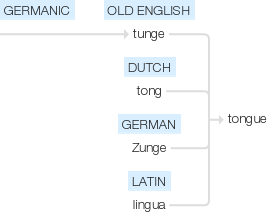Tongue
Old English tunge, of Germanic origin; related to Dutch tong, German Zunge, and Latin lingua .
wiktionary
From Middle English tonge, tunge, tung, from Old English tunge, from Proto-West Germanic *tungā, from Proto-Germanic *tungǭ(“tongue”) (compare West Frisian tonge, Dutch tong, Luxembourgish Zong, German Zunge, Yiddish צונג (tsung), Danish tunge, Norwegian Bokmål tunge, Swedish tunga, Gothic 𐍄𐌿𐌲𐌲𐍉( tuggō)), from Proto-Indo-European *dn̥ǵʰwéh₂s.
See also Old Irish tengae, Latin lingua, Tocharian A käntu, Tocharian B kantwo, Lithuanian liežùvis, Russian язык(jazyk), Polish język, Old Armenian լեզու(lezu), Avestan 𐬵𐬌𐬰𐬎𐬎𐬁 (hizuuā), Ashkun žū, Kamkata-viri dić, Sanskrit जिह्वा(jihvā́). Doublet of langue and lingua.
etymonline
tongue (n.)
Old English tunge "tongue, organ of speech; speech, a people's language," from Proto-Germanic *tungō (source also of Old Saxon and Old Norse tunga, Old Frisian tunge, Middle Dutch tonghe, Dutch tong, Old High German zunga, German Zunge, Gothic tuggo), from PIE root *dnghu- "tongue."
For substitution of -o- for -u-, see come. The spelling of the ending of the word apparently is a 14c. attempt to indicate proper pronunciation, but the result is "neither etymological nor phonetic, and is only in a very small degree historical" [OED]. In the "knowledge of a foreign language" sense in the Pentecostal miracle, from 1520s. Tongue-tied is first recorded 1520s. To hold (one's) tongue "refrain from speaking" was in Old English. Johnson has tonguepad "A great talker."
Bewar of tungis double and deceyuable,
Which with ther venym infect ech companye,
Ther poynaunt poisoun is so penetrable.
[John Lydgate, Fall of Princes (c. 1439)]
tongue (v.)
"to touch with the tongue, lick," 1680s, from tongue (n.). Earlier as a verb it meant "drive out by order or reproach" (late 14c.). Related: Tongued; tonguing.
